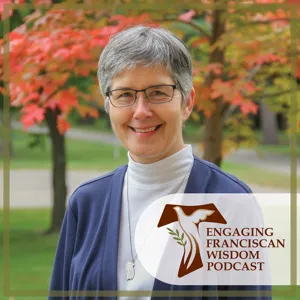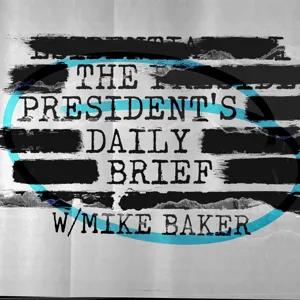Podcast Summary
Looking back at the Michigan statehouse occupation in April 2020 reveals the depth of anger and willingness to use violence against public health policies.: Examining past incidents like the Michigan statehouse occupation highlights the intensity of opposition to public health measures and the potential for violence.
Understanding the events of January 6, 2021, requires looking back at earlier moments, such as the armed militia occupation of the Michigan statehouse in April 2020. This incident, often overlooked, revealed the depth of anger and willingness to use violence against public health policies. Wise, on the other hand, offers a solution for managing money across currencies at real-time exchange rates with no hidden fees. It's a practical tool for individuals navigating the complexities of international finance. The Capital Ideas podcast, meanwhile, offers insights from investment professionals, while the January 6th committee continues its investigation into the attack on the Capitol.
The Crisis in America: A Complex Amalgamation of Factors: The right-wing's fear and paranoia over government pandemic control efforts ignited by Trump fueled the Capitol riots, a manifestation of the mob mentality that had been brewing since 2020.
The crisis in America cannot be reduced to a single issue, be it political, cultural, economic, or informational. Rather, it's a complex amalgamation of these and other factors. A significant number of people on the right, particularly those who have been influenced by propaganda, conspiracy theories, and lies, view government efforts to control the pandemic as an infringement on their freedoms, fueled by a deep-seated fear and paranoia. Donald Trump, with his uncanny ability to tap into this reservoir of fear and anger, was the perfect catalyst for the explosive situation that unfolded on January 6th at the Capitol. The events of that day, as documented in the speaker's footage, were a chilling reminder of the mob mentality that had been building since the spring of 2020.
A surreal mix of cartoonish behavior and extreme violence marked the Capitol events: The Capitol events on January 6, 2021, showcased a dangerous mix of misguided beliefs, conspiracy theories, and violent actions, highlighting the importance of fact-checking and critical thinking to prevent similar situations in the future.
The events at the Capitol on January 6, 2021, were marked by a bizarre and disturbing combination of cartoonish behavior and extreme violence. The participants ranged from earnest but misguided individuals to those who were clearly seeking bloodshed. The surreal nature of the day was further highlighted by the disbelief and awe of some attendees, who couldn't reconcile their expectations with the reality they faced. The mob mentality took over quickly, and it didn't matter what brought people to the Capitol; the situation escalated rapidly. It's infuriating to see conspiracy theorists and grifters profit from spreading false information that led to this moment, making it all the more important to separate fact from fiction. The events of that day were a stark reminder of the dangerous consequences of spreading misinformation and the importance of critical thinking and fact-checking.
Civil Rights Rhetoric in Anti-Lockdown and Pro-Law Enforcement Movements: During the COVID-19 pandemic, some anti-lockdown and pro-law enforcement figures co-opted civil rights rhetoric, while using vitriolic language towards law enforcement during earlier protests. This shift was driven by political climates and racial divisions in places like Michigan.
The anti-lockdown and pro-law enforcement movements in the United States during the COVID-19 pandemic saw a surprising co-opting of civil rights rhetoric and identity. This was evident in the speeches and actions of figures like Alex Jones, Nicholas Fuentes, and local sheriffs who positioned themselves as heroes resisting state tyranny. However, this rhetoric was a stark contrast to the vitriolic language used towards law enforcement during earlier anti-lockdown protests. For instance, in Michigan, anti-lockdown protesters berated police officers and compared them to the Gestapo and Nazis. This shift in rhetoric was a way for these groups to pivot and oppose the demands for racial justice that had spread across the country following George Floyd's murder. The history of White Christian paramilitarism in Michigan, along with its racial divisions, created a volatile political climate that contributed to these tensions. Overall, the book provides a nuanced exploration of the complex sentiments and movements that emerged during this period in American history.
Extreme beliefs during crises: People may hold extreme beliefs during crises to justify actions and preserve moral righteousness, leading to drastic actions and openness to conspiracy theories
During times of crisis, people may hold extreme beliefs to justify their actions and preserve a sense of moral righteousness. This was evident in the actions of some anti-lockdown protesters who compared mask mandates to concentration camps and saw themselves as victims of persecution and oppression. This belief allowed them to take drastic actions, including attacking democratic institutions, and view themselves as patriots. Additionally, these individuals were surprisingly open to conspiracy theories about the pandemic due to their unwillingness to make personal sacrifices and fear of being labeled unpatriotic. This mindset, driven by a sincere belief in the existential threat they faced, allowed them to rationalize their actions and maintain a sense of moral integrity.
Financial app Wise simplifies international money transfers: Wise processed over $100 billion in 2023, with half of those transfers reaching their destination faster than listening to this ad. The app's significance extends beyond financial transactions, reflecting the complex relationship between race and the political climate.
Wise is a financial app that simplifies managing money in different currencies. With real-time mid-market exchange rates and no hidden fees, it's popular for international transfers and travel money. The app processed over $100 billion in 2023, with half of those transfers reaching their destination faster than listening to this ad. The app's significance extends beyond financial transactions, as seen in the story of Karl Mannke, a Michigan barber who defied lockdown orders and became a symbol of resistance. Mannke's comment about feeling dispossessed from his country highlights the complex relationship between race and the political climate, with some seeing themselves as civil rights fighters while others hold contradictory beliefs. The current social and political climate has brought these contrasting perspectives to the forefront, revealing the intricacies of modern society.
The deep-rooted sense of victimhood among some individuals leads them to victimize others: Understanding the factors influencing people's hate towards their fellow Americans and their country is crucial for empathy and resolution.
The deep-rooted sense of victimhood among some individuals has led them to become invested in ideologies that victimize others, often without realizing it. This was illustrated in an anecdote from the 2020 election, where a white mob accused black election workers of dishonesty and corruption. One white Republican, despite evidence to the contrary, believed he was in danger and left the scene due to fear of Black Lives Matter. It's essential to understand the factors leading people to hate their fellow Americans and their country, rather than labeling them as two-dimensional cartoon characters. Even those with sincere beliefs, like Stacy who reported alleged fraud during the election, were influenced by their elected representatives and news outlets. Empathy and understanding are crucial in addressing these complex issues.
Deep-seated frustrations and delusions fueling a war in the US: The pandemic and political tensions have heightened deep-seated frustrations and delusions, leading some Americans to desire violent revolution, despite material grievances being the real issue.
The pandemic and political tensions in the US have crystallized deep-seated frustrations and delusions, leading to a war fueled not by injury but by delusion. The American notion of freedom is often impoverished, with fears of totalitarianism overshadowing the reality of economic and social vulnerabilities. The lack of exposure to real warfare and its consequences may contribute to the desire for violent revolution among some Americans. The speaker's experiences covering conflicts abroad and domestic unrest highlight the stark contrast between material grievances and fabricated antagonists in the US.
Effective response to Ebola crisis in Liberia and Sierra Leone: Despite minimal resources and recent history of conflict, Liberia and Sierra Leone effectively contained the Ebola virus through grassroots mobilization, contact tracing, and quarantines.
During the Ebola crisis in Liberia and Sierra Leone, these countries with minimal resources managed to effectively respond and contain the virus through grassroots mobilization, contact tracing, and quarantines. This was impressive given their recent history of civil war and violent conflict. Contrastingly, in today's political climate, threats are real but so are the unserious actions of some involved. The line between fiction and reality is becoming increasingly blurred, and conflicts are being fueled by an information ecosystem that thrives on drama. One concerning development is the use of paintball guns by extremist groups, which could easily transition to real bullets. Mogelson expresses concern about the future given these realities.
Rising Influence of Extremist Ideologies in Politics: The normalization of extremist views and the emboldening of hateful ideologies in politics is a dangerous trend that requires serious attention and action to prevent future violent and divisive events.
The current political climate in the country is a cause for concern due to the increasing adoption and endorsement of extremist ideologies by one of the major political parties. The presence and influence of figures like Chester Doles, a lifelong white nationalist and KKK leader, should not be ignored. His belief that the climate is now ready for a major rebellion against the government by white Christians is a chilling prospect. The events of January 6th, 2021, should have served as a wake-up call, but the Republican party establishment's lack of accountability and continued excusing of such behavior is worrying. The normalization of extremist views and the emboldening of hateful ideologies is a dangerous trend that requires serious attention and action. The failure to acknowledge and address these issues could lead to more violent and divisive events in the future.
The Capitol attack and its aftermath: a threat to American democracy: The Capitol attack highlighted the threat of political violence, with anti-government figures seeking to interfere in the electoral process and undermine trust in institutions, leading to fear, instability, and resignations.
The threat of political violence, as demonstrated by the Capitol attack, has become a daunting and ongoing issue in American politics. Anti-government figures, like those mentioned, have realized they can interfere in the electoral process and undermine trust in institutions with little consequence. Some of these individuals are genuinely seeking to overthrow the system, while others may be capitalizing on the public's desire for change. Regardless, the consequences are the same: a climate of fear and instability. This threat has already led to the suspension of government functions, the resignation of election officials, and even the retirement of members of Congress. It's a demand-side problem that's tough to rein in, and it's essential to address it before it leads to larger-scale violence. The book "The Storm Is Here" offers a compelling exploration of this issue.
Behind the Scenes of 'The Gray Area' Podcast: A team of dedicated individuals work together to produce 'The Gray Area' podcast, with Eric Janikas producing, Amy Drosdowska editing, Patrick Boyd engineering, Alex Overington composing, and a m Hall overseeing.
The production of "The Gray Area" podcast involves a team of dedicated individuals with distinct roles. Eric Janikas produces the show, Amy Drosdowska edits it, Patrick Boyd engineers it, Alex Overington composes the theme music, and a m Hall serves as the boss. This conversation provided insight into their roles and the intensity of their work. We encourage listeners to share their thoughts and engage with us by emailing thegrayarea@vox.com. Don't forget to leave a review, share the podcast, and tune in for new episodes every Monday and Thursday.






